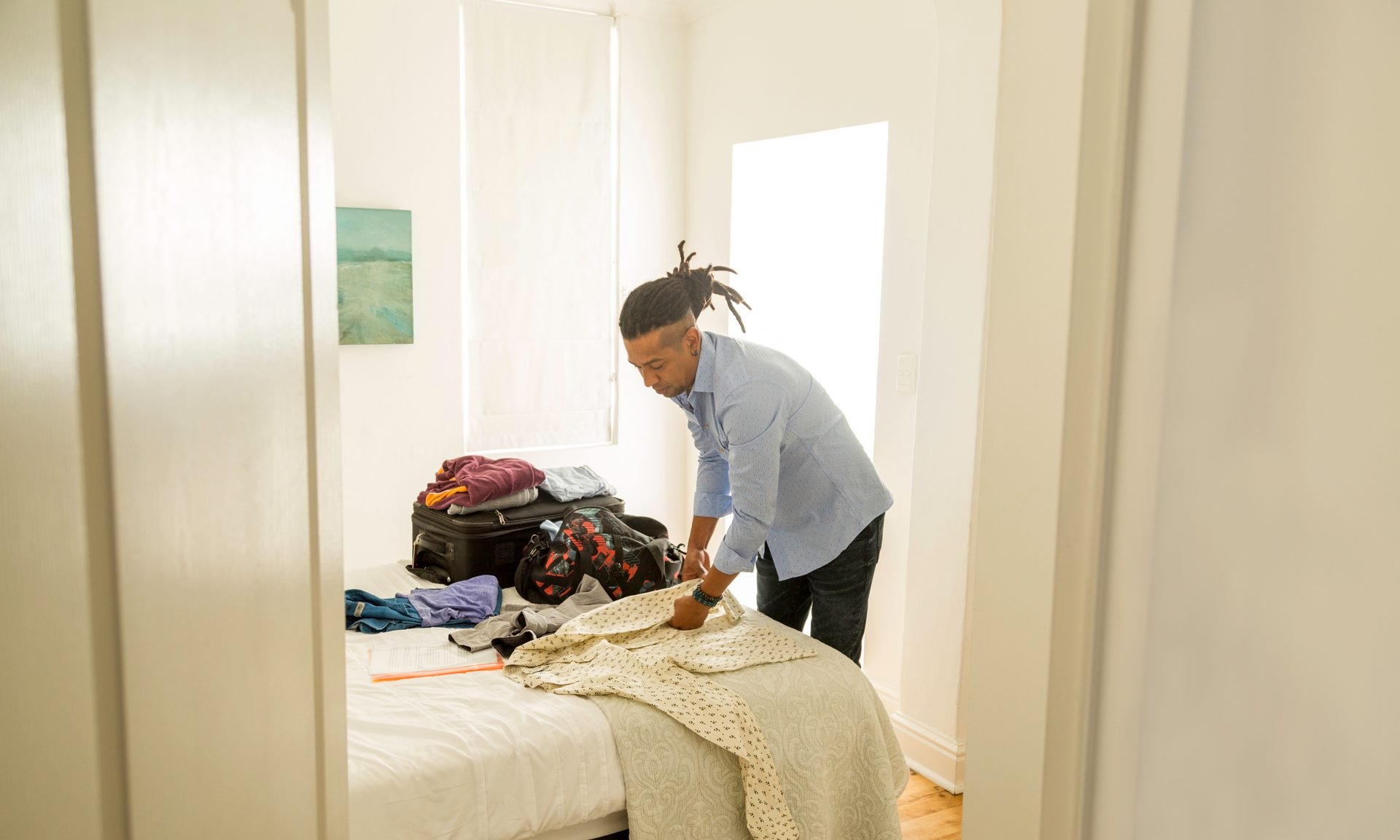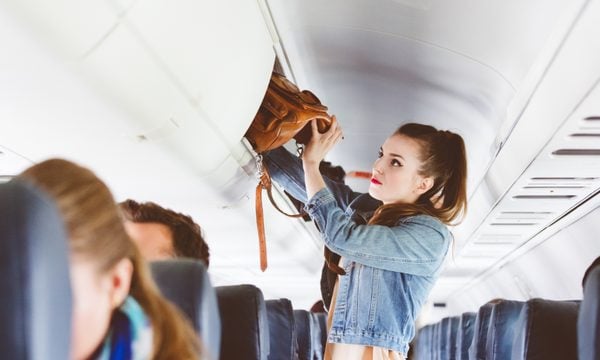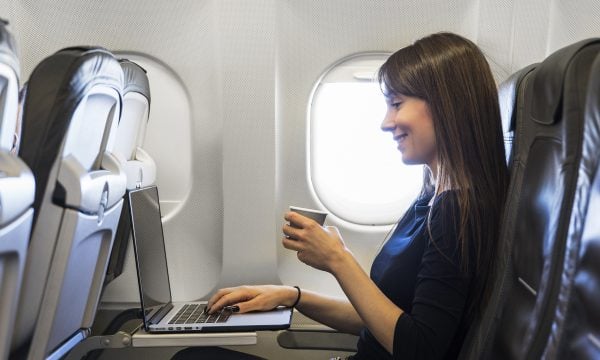How to Maximize Your Luggage by Understanding Suitcase Sizes
Avoid extra fees and hassle at check-in by confirming that your luggage meets carrier size and weight standards.

Many or all of the products on this page are from partners who compensate us when you click to or take an action on their website, but this does not influence our evaluations or ratings. Our opinions are our own.
Odds are you're going to bring along some luggage with you on your next trip. This is true whether you're boarding a plane, train or automobile — but the mode you choose could impact the bags you bring, especially when taking to the skies.
Let's look at each airline's luggage size restrictions, how to measure your bags and ways to get free checked luggage on airlines.
Check in luggage size chart
If you're traveling on an aircraft, where you're traveling may impact how large your bags can be. Also, international sizes aren't necessarily the same as domestic sizing requirements, so double-check your suitcase size before bringing your bags along.
Here are the measurements for check-in luggage sizes when flying with airline carriers in the United States.
| Airline | Size | Weight |
|---|---|---|
| Allegiant Airlines. | Maximum of 80 inches (length + width + height). | 50 pounds. |
| Alaska Airlines. | Maximum of 62 inches (length + width + height). | 50 pounds. |
| American Airlines. | Maximum of 62 inches (length + width + height). | 50 pounds. (may differ based on cabin and elite status). |
| Delta Air Lines. | Maximum of 62 inches (length + width + height). | 50 pounds. (may differ based on cabin and elite status). |
| Frontier Airlines. | Maximum of 62 inches (length + width + height). | 40 pounds. |
| Hawaiian Airlines. | Maximum of 62 inches (length + width + height). | 50 pounds. |
| JetBlue Airways. | Maximum of 62 inches (length + width + height). | 50 pounds. (may differ based on cabin and elite status). |
| Southwest Airlines. | Maximum of 62 inches (length + width + height). | 50 pounds. |
| Spirit Airlines. | Maximum of 62 inches (length + width + height). | 50 pounds. |
| United Airlines. | Maximum of 62 inches (length + width + height). | 50 pounds. (may differ based on cabin and elite status). |
Note that some airlines may also have different baggage policies based on where you're traveling. American Airlines, for instance, allows passengers flying to Australia or New Zealand to check bags up to 70 pounds. This is great news if you're traveling with a large suitcase.
» Learn more: Which airlines have the best (and worst) fees?
How to measure luggage size
Large checked luggage sizes can be problematic, especially if traveling on a low-cost carrier like Spirit Airlines or Frontier Airlines.
To avoid oversized baggage fees, you'll want to measure any checked luggage before your flight. This includes both the size and the weight.
🤓 Nerdy Tip
Luggage scales are a cheap and effective way to get an accurate weight measurement on your suitcases. Measuring the size of your luggage isn't tricky. Most airlines require that your bag be 62 linear inches or less. Therefore, your bag's length, width and height cannot exceed 62 inches. This measurement includes the wheels and the handle of your luggage.
To measure your bag, you'll want to grab a tape measure. First, lay your bag flat on the ground, then measure its height. Next, you'll want to measure how long and wide it is.
If your bag has an expandable feature that you plan to use, be sure to expand it before you measure.
Once you've gathered all three data points, add them together. For example, if your bag is 24 inches tall, 20 inches long and 18 inches wide, its total linear length is 62 inches.
Note that using modern spinner bags, which include four wheels on the bottom of your suitcase, means you'll have less space within your actual bag. This is thanks to the requirement to include wheels and handles in your measurements.
If this all sounds a little overwhelming, don't worry. Most luggage companies design their bags to fit within these standards. So if your bag isn't huge or a strange shape, the odds are that it'll fit within the dimensions required by airlines.
» Learn more: Ways to avoid paying checked baggage fees

By signing up, you will receive newsletters and promotional content and agree to our Terms of Use and acknowledge the data practices in our Privacy Policy. You may unsubscribe at any time.
How to get free checked luggage
Want to avoid checked luggage fees? There are a few ways to do so.
Elite status
The first way to avoid those fees is to achieve elite status with a specific airline. Often, even the lowest elite status tiers have the advantage of free checked bags.
🤓 Nerdy Tip
Active duty military and veterans can take advantage of complimentary checked bags on many airlines. On United Airlines, for example, Silver elite members get one free checked bag on all flights, even when flying basic economy. Even better, their baggage allowance is bumped up to 70 pounds — an additional 20 pounds over those without elite status.
» Learn more: The beginner's guide to airline elite status
Co-branded credit cards
Many airlines offer co-branded credit cards that'll give you a free checked bag on flights. This includes airlines such as:
These cards may charge an annual fee, but if you fly just a few times yearly, it pays for itself with free checked luggage.
» Learn more: The best airline credit cards right now
Travel cards
Don't want to commit yourself to a single airline but still want free checked bags? A few different travel cards come with an annual airline fee credit.
This credit will reimburse you for expenses you incur while traveling, including checked luggage fees, seat assignments and lounge access.
The American Express Platinum Card® is one, as is the Bank of America® Premium Rewards® credit card.
Terms apply.
» Learn more: The best travel credit cards right now
Luggage sizes recapped
No matter how you're traveling, it's essential to understand the size of your suitcase. After all, you don't want to be maxed out on a trip before you even depart — where would you put your souvenirs?
If you plan on hopping on a plane, look at our detailed checked luggage size chart and recommendations for avoiding checked luggage fees.
How to maximize your rewards
You want a travel credit card that prioritizes what’s important to you. Here are some of the best travel credit cards of 2026:
- Flexibility, point transfers and a large bonus: Chase Sapphire Preferred® Card
- No annual fee: Wells Fargo Autograph® Card
- Flat-rate travel rewards: Capital One Venture Rewards Credit Card
- Bonus travel rewards and high-end perks: Chase Sapphire Reserve®
- Luxury perks: American Express Platinum Card®
- Business travelers: Ink Business Preferred® Credit Card
Article sources
NerdWallet writers are subject matter authorities who use primary,
trustworthy sources to inform their work, including peer-reviewed
studies, government websites, academic research and interviews with
industry experts. All content is fact-checked for accuracy, timeliness
and relevance. You can learn more about NerdWallet's high
standards for journalism by reading our
editorial guidelines.
Limited Time Only: Earn $1,000 Toward Travel!
Capital One Venture Rewards Credit Card 
Travel

For a limited time, the
Capital One Venture Rewards Credit Card is offering new cardholders an especially rich bonus: Enjoy $250 to use on Capital One Travel in your first cardholder year, plus earn 75,000 bonus miles once you spend $4,000 on purchases within the first 3 months from account opening - that’s equal to $1,000 in travel!
More like this
Related articles









